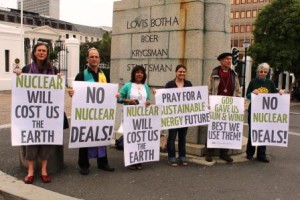Treasury has not Explored Nuclear
- Published:
 SAFCEI has held weekly nuclear vigils outside Parliament, with people of faith demanding ethical governance around nuclear energy.
SAFCEI has held weekly nuclear vigils outside Parliament, with people of faith demanding ethical governance around nuclear energy.
Treasury has responded to the Southern African Faith Communities’ Environment Institute (SAFCEI)’s application for information regarding the nuclear deals.
SAFCEI believes that prior to entering into any international nuclear agreements, it would be imperative to investigate any financial obligations that the country might incur under such agreements. Such obligations would presumably be drawn from experts responsible for the national budget and should require treasury approval, or at least investigation.
In the case of nuclear framework agreements, article 2 of an earlier draft Russian agreement included a clause:
“.. design, construction, operation and decommissioning of nuclear power plants in accordance with the requirements of the Republic of South Africa, including enhancement of key elements of nuclear energy infrastructure”.
Such activities might conceivably have serious financial and economic impacts and it would be sound corporate governance for the country to put such agreements under a financial microscope and particularly, for the government arm that looks after the public purse to investigate any economic impacts that might arise from such international agreements.
SAFCEI therefore asked Treasury for all “Records reflecting decisions taken related to the financial obligations and the economic impact of the decisions reflected in intergovernmental agreements on current strategic partnerships and cooperation in nuclear energy” in terms of the Promotion of Access to Information Act (PAIA).
The Treasury has responded to our request for information as follows:
“no decisions related to the financial obligations and economic impact have been taken by the National Treasury.” And further “The National Treasury does not have the records sought by the Requester”.
“The implication of this acknowledgement by Treasury is that the South Africa nation has entered into an international agreement without doing their financial homework” said Ms Liz McDaid, who heads up SAFCEI’s ethical governance project.
At a board meeting in October, SAFCEI elected to seek legal counsel to investigate the nuclear contracts which South Africa had signed. Faith communities are gravely concerned at the government’s continued support for nuclear energy despite evidence that South Africa cannot afford it.
SAFCEI supports affordable energy that will enable our country to address the current social inequities and promote ecologically and socially responsible development, rather than large fossil fuel and nuclear central power plants that run over budget, over time, and pose considerable risk of corruption.
Board member Ani Tsondru stated that “SAFCEI believes that the citizens of the country need to know how they will be affected by any international agreements we sign. It is disturbing to find that treasury had no role in such a prominent international agreement which will have such great economic, social and environmental implications for so very many years to come.”
END
ISSUED BY SAFCEI 30TH NOVEMBER 2014
(published in Business Day 2nd December 2014)
Who we are

SAFCEI (Southern African Faith Communities’ Environment Institute) is a multi-faith organisation committed to supporting faith leaders and their communities in Southern Africa to increase awareness, understanding and action on eco-justice, sustainable living and climate change.
Featured Articles
-

South Africa: Who Ends Up Paying If DMRE Cooks the Price of Nuclear Power?
-

South Africa’s nuclear energy expansion plans continue to draw criticism, environmental NGOs chew over legal challenge
-

Earthlife Africa and SAFCEI respond to latest unsettling nuclear news regarding the ministerial determination
-

Open Wing Alliance Africa (Virtual) Summit 2023
-

The Green Connection and SAFCEI respond to energy minister's divisive and deflecting comments
-

Job Vacancy: FLEAT Coordinator







